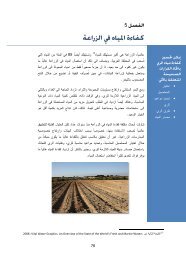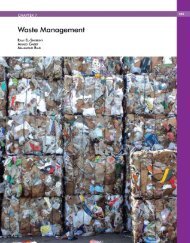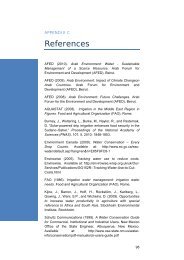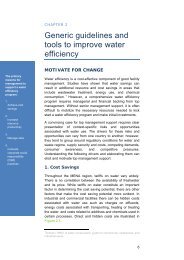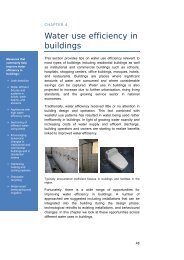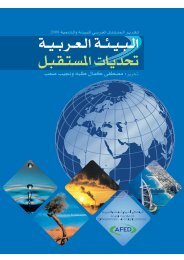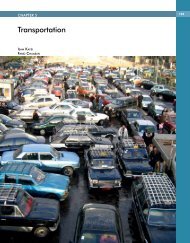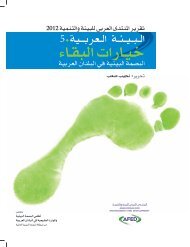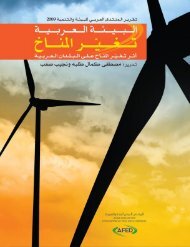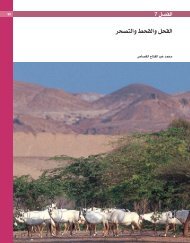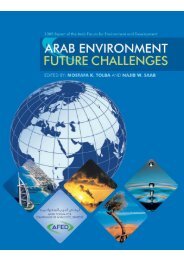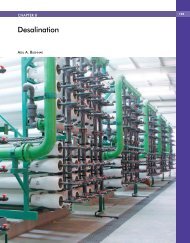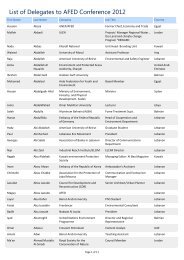Impact of Climate Change on Arab Countries - (IPCC) - Working ...
Impact of Climate Change on Arab Countries - (IPCC) - Working ...
Impact of Climate Change on Arab Countries - (IPCC) - Working ...
You also want an ePaper? Increase the reach of your titles
YUMPU automatically turns print PDFs into web optimized ePapers that Google loves.
ARAB ENVIRONMENT: CLIMATE CHANGE 147<br />
decide which envir<strong>on</strong>mental services should be<br />
targeted for liberalizati<strong>on</strong> at the nati<strong>on</strong>al level in<br />
a country’s schedule <str<strong>on</strong>g>of</str<strong>on</strong>g> commitments. viii This is<br />
not the case for envir<strong>on</strong>mental goods where tariff<br />
reducti<strong>on</strong>s would need to be applied to a comm<strong>on</strong><br />
set <str<strong>on</strong>g>of</str<strong>on</strong>g> envir<strong>on</strong>mental goods agreed to by all<br />
WTO members. ix<br />
Negotiati<strong>on</strong> <strong>on</strong> the liberalizati<strong>on</strong> <str<strong>on</strong>g>of</str<strong>on</strong>g> envir<strong>on</strong>mental<br />
goods in the Doha round faces enormous<br />
challenges and to date its outcome remains undetermined,<br />
be it within the overall package <str<strong>on</strong>g>of</str<strong>on</strong>g> the<br />
Doha round or – if ventured by some – a standal<strong>on</strong>e<br />
or plurilateral agreement within the WTO.<br />
No agreement has yet been reached <strong>on</strong> a boundary<br />
for EGS.<br />
The extent to which energy will be incorporated<br />
into the trading system through the negotiati<strong>on</strong><br />
<str<strong>on</strong>g>of</str<strong>on</strong>g> EGS – if these negotiati<strong>on</strong>s are to see the light<br />
<str<strong>on</strong>g>of</str<strong>on</strong>g> day – depends up<strong>on</strong> how envir<strong>on</strong>mental<br />
goods’ boundaries will be defined, and more precisely,<br />
whether end-use criteria and PPMs should<br />
be required to define envir<strong>on</strong>mental goods. x It is<br />
the prospect <str<strong>on</strong>g>of</str<strong>on</strong>g> the inclusi<strong>on</strong> <str<strong>on</strong>g>of</str<strong>on</strong>g> PPMs in the definiti<strong>on</strong><br />
<str<strong>on</strong>g>of</str<strong>on</strong>g> envir<strong>on</strong>mental goods coupled with the<br />
emergence in the developed countries <str<strong>on</strong>g>of</str<strong>on</strong>g> envir<strong>on</strong>mental<br />
policies, higher standards and regulati<strong>on</strong>s<br />
in value added energy sectors (chemicals and fertilizers,<br />
plastics, aluminium, and cement), and<br />
increasing levels <str<strong>on</strong>g>of</str<strong>on</strong>g> investment in renewable energy<br />
that is <str<strong>on</strong>g>of</str<strong>on</strong>g> particular interest to the <strong>Arab</strong><br />
world. xi<br />
PPMs<br />
PPMs, which refer to the way in which a product<br />
is made, have l<strong>on</strong>g been a c<strong>on</strong>troversial feature <str<strong>on</strong>g>of</str<strong>on</strong>g><br />
the trade and envir<strong>on</strong>ment debate. In spite <str<strong>on</strong>g>of</str<strong>on</strong>g><br />
GATT precedents that the ‘likeness’ xii <str<strong>on</strong>g>of</str<strong>on</strong>g> products<br />
(a litmus test to protect against discriminati<strong>on</strong>)<br />
should not be determined <strong>on</strong> the basis <str<strong>on</strong>g>of</str<strong>on</strong>g><br />
the method <str<strong>on</strong>g>of</str<strong>on</strong>g> producti<strong>on</strong> or producti<strong>on</strong> processes,<br />
xiii envir<strong>on</strong>mentalists have fought against this<br />
view, noting that PPMs are fundamental to minimizing<br />
the envir<strong>on</strong>mental impact <str<strong>on</strong>g>of</str<strong>on</strong>g> a product<br />
during its life-cycle. xiv As it stands, trade rules<br />
allow for distincti<strong>on</strong>s between products solely <strong>on</strong><br />
the basis <str<strong>on</strong>g>of</str<strong>on</strong>g> the end uses and characteristics <str<strong>on</strong>g>of</str<strong>on</strong>g> the<br />
products themselves. The introducti<strong>on</strong> <str<strong>on</strong>g>of</str<strong>on</strong>g> PPMs<br />
into the definiti<strong>on</strong> <str<strong>on</strong>g>of</str<strong>on</strong>g> envir<strong>on</strong>mental goods aimed<br />
at climate change mitigati<strong>on</strong> would then reverse<br />
this, allowing like products whose end uses and<br />
characteristics are the same to be treated differently.<br />
This would pose a significant challenge to<br />
the <strong>Arab</strong> world, whose producti<strong>on</strong> is dominated<br />
by carb<strong>on</strong>-intensive activity. Moreover, the<br />
introducti<strong>on</strong> <str<strong>on</strong>g>of</str<strong>on</strong>g> PPMs here will certainly open<br />
the backdoor for member states to challenge<br />
‘likeness’ elsewhere, essentially erecting trade barriers<br />
<strong>on</strong> the basis <str<strong>on</strong>g>of</str<strong>on</strong>g> loosely related producti<strong>on</strong><br />
factors.<br />
For the <strong>Arab</strong> ec<strong>on</strong>omies, in additi<strong>on</strong> to being<br />
reliant <strong>on</strong> carb<strong>on</strong>-intensive activities and traditi<strong>on</strong>al<br />
energy producti<strong>on</strong>, almost all are net<br />
importers <str<strong>on</strong>g>of</str<strong>on</strong>g> ‘clean technologies’ and their associated<br />
goods. In principle, trade measures are an<br />
important channel for the diffusi<strong>on</strong> <str<strong>on</strong>g>of</str<strong>on</strong>g> climate<br />
mitigati<strong>on</strong> goods. In reality, however, adapting<br />
solely trade measures aimed at carb<strong>on</strong> reducti<strong>on</strong><br />
will have significant adverse impacts up<strong>on</strong> traditi<strong>on</strong>al<br />
energy producers and fossil fuel exports,<br />
given the absence <str<strong>on</strong>g>of</str<strong>on</strong>g> positive measures designed<br />
to stimulate diversificati<strong>on</strong>, development, growth<br />
and transiti<strong>on</strong> toward low-carb<strong>on</strong> producti<strong>on</strong>



